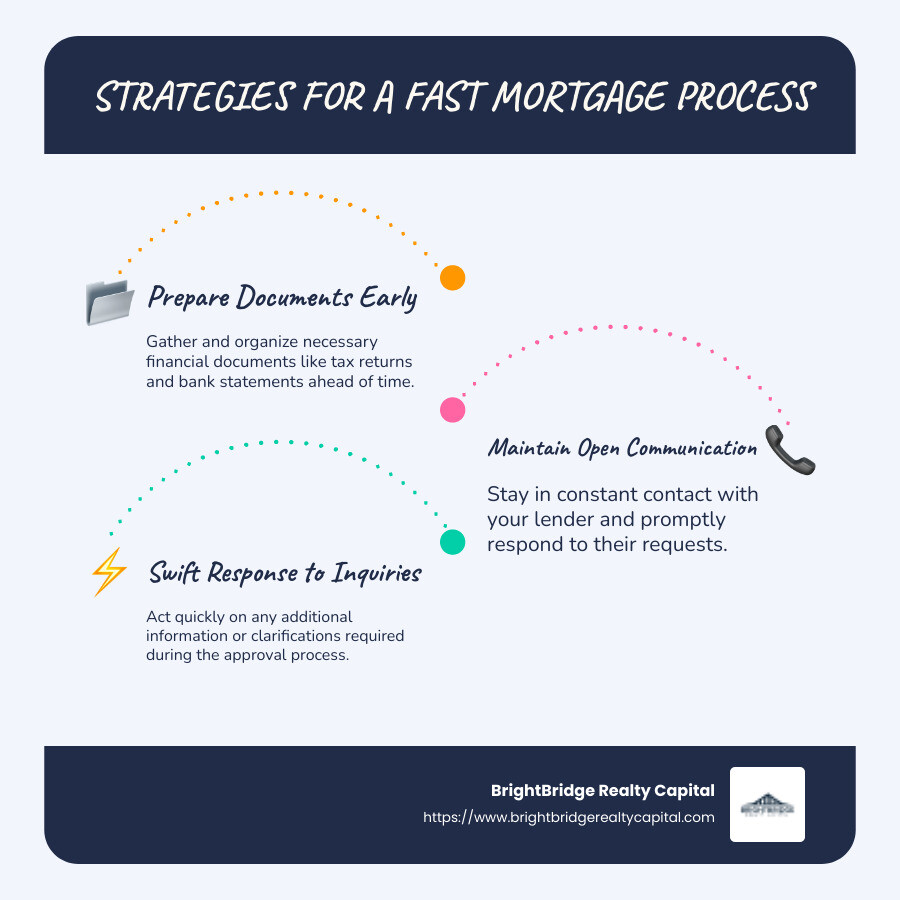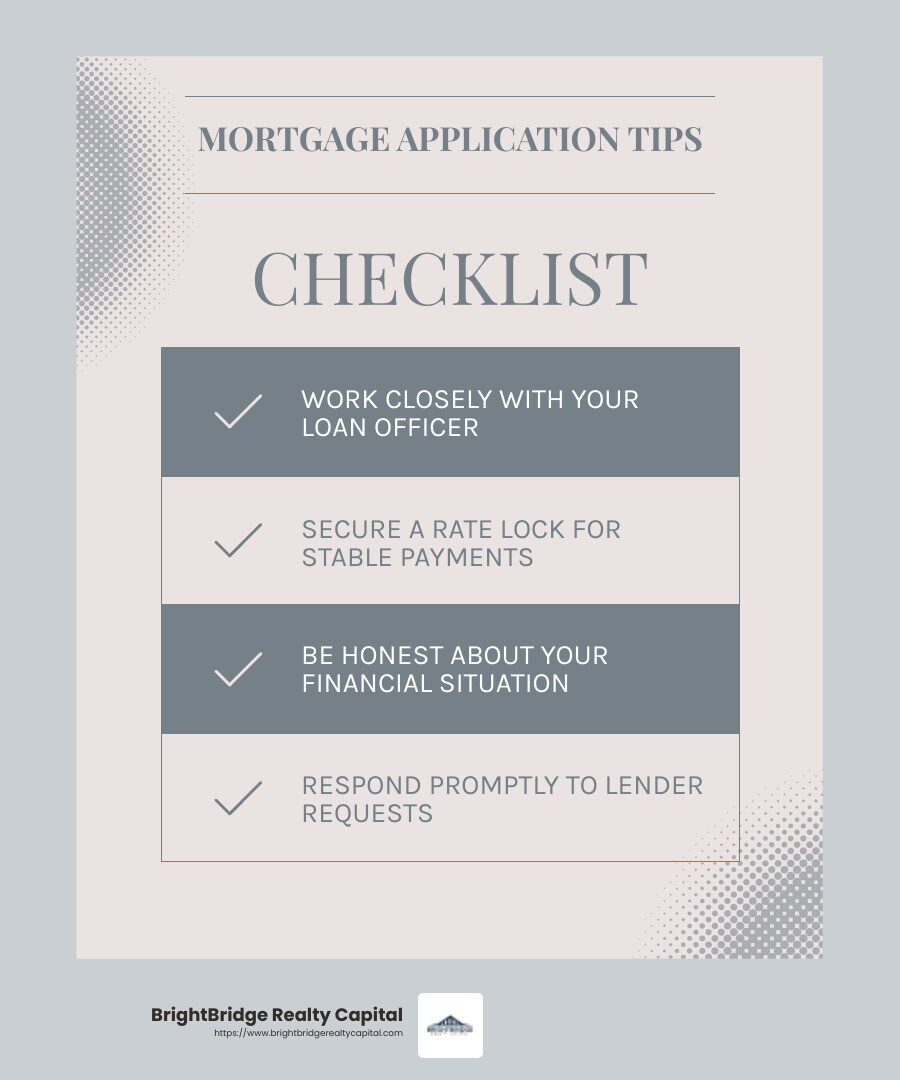Fast Track to Homeownership: A Guide to Quick Mortgage Approval

Fast mortgage process is a game-changer for real estate investors looking to seize opportunities swiftly. A quick approval can mean the difference between securing the property of your dreams or losing out to competitors. As interest rates stabilize, streamlining your mortgage journey can be crucial for timely investments.
- Respond quickly to lender requests.
- Prepare necessary documents ahead of time.
- Stay in constant contact with your lender.
The benefits are clear: Efficiency in the mortgage process can translate to faster homeownership and a smoother transition into your investment property.
In this guide, we'll walk you through the essentials of achieving a quick mortgage approval. Whether it's understanding the pre-approval stage, preparing the right documentation, or ensuring a hassle-free closing, we've got you covered. Let's explore the strategies that make BrightBridge Realty Capital the go-to choice for investors seeking fast and reliable financing solutions.

Fast mortgage process terminology:
Understanding the Fast Mortgage Process
Key Steps to Speed Up Approval
Securing a mortgage quickly isn't just a dream—it's attainable with the right approach. Let's break down the key steps to fast-track your mortgage approval.
1. Pre-Approval: Your First Step
Getting pre-approved is like getting a head start in a race. It shows sellers you're serious and gives you a clear picture of your budget. During pre-approval, lenders conduct a credit check and assess your financial situation. This helps determine how much they’re willing to loan you. The pre-approval process can save you a week or more in the closing timeline.
2. Loan Processing: Gathering Essentials
Once pre-approved, you'll move to loan processing. Here, you'll need to provide essential financial documents. Think of this as your mortgage toolkit, including:
- W-2s and tax returns from the last two years
- Recent pay stubs
- Bank statements
Having these documents ready can shave days off your approval time. Consider scanning them in advance for easy access.
3. Underwriting: The Detailed Review
Underwriting is where the lender digs deeper. They verify your information and assess risk. Be open and honest during this stage. Hiding details can lead to delays or even denial. Lenders will uncover any discrepancies through credit checks and public records.
4. Closing: The Final Countdown
You're almost there! Closing involves finalizing all paperwork and transferring ownership. A pre-approval letter can make this process smoother, as it shows you're already vetted by the lender.
To ensure a smooth closing:
- Double-check all documents for accuracy.
- Respond promptly to any additional requests from your lender.
- Keep communication lines open.

By understanding and preparing for each step, you can steer the fast mortgage process with ease. This proactive approach not only speeds up approval but also minimizes stress, allowing you to focus on your new home or investment property. Next, we'll explore how to prepare for a quick mortgage approval, diving into credit scores and budget planning essentials.
Preparing for a Quick Mortgage Approval
Essential Documents for Fast Processing
Speeding up your mortgage approval begins with preparation. Key elements include understanding your credit score, managing your debt-to-income ratio, and having a solid budget plan. These steps are essential to ensure a streamlined process.
1. Credit Score: Your Financial Snapshot
Your credit score is a major factor in mortgage approval. It reflects your creditworthiness and impacts the loan terms you might receive. Most conventional mortgages require a credit score of at least 620. However, some loans, like those backed by the FHA, may accept scores as low as 500. Knowing your score and working to improve it if necessary can make a big difference.
2. Debt-to-Income Ratio: Balancing Act
Lenders look at your debt-to-income (DTI) ratio to assess your ability to repay the loan. This ratio compares your monthly debt payments to your gross monthly income. Aim for a DTI ratio below 36% to increase your chances of approval. If your DTI is high, consider paying down debts to improve your standing.
3. Budget Planning: Know Your Limits
Before diving into the home buying process, create a budget. Factor in down payments, closing costs, and monthly mortgage payments. This will help you understand what you can afford and prevent financial strain later.
Essential Documents: Be Ready
Having the right documents ready is crucial for a fast mortgage process. These include:
- W-2s: Provide your W-2 statements from the last two years to verify your income.
- Tax Returns: Lenders often request your federal tax returns to get a comprehensive view of your financial health.
- Bank Statements: Your two most recent bank statements help lenders assess your savings and spending habits.
- Pay Stubs: Recent pay stubs confirm your current income and employment status.
Consider scanning these documents ahead of time. This way, you can quickly provide them when requested, shaving days off your approval time.
By preparing these elements in advance, you set yourself up for a quick mortgage approval. Next, we'll steer the mortgage application process, focusing on how to work effectively with your loan officer and secure a rate lock.
Navigating the Mortgage Application
Tips for a Smooth Application
The mortgage application process can feel like a maze. But with the right approach, you can steer it smoothly and efficiently. Here are some key tips:
1. Work Closely with Your Loan Officer
Your loan officer is your guide through this journey. Their job is to help you understand the process and ensure everything is on track. Communicate openly and ask questions if you're unsure about anything. A good relationship with your loan officer can make a huge difference in achieving a fast mortgage process.
2. Secure a Rate Lock
Interest rates can fluctuate. A rate lock protects you from these changes during the closing process. Once you find a rate you're comfortable with, ask your lender to lock it in. This gives you peace of mind and can prevent unexpected increases in your monthly payments.
3. Be Honest with Your Lender
Always be upfront about your financial situation. It might be tempting to hide certain debts or financial issues, but honesty is crucial. Lenders will uncover any discrepancies during the approval process, which could lead to delays or even denial. As noted in the research, "withholding information...can constitute loan fraud."
4. Respond Promptly
Timely responses to your lender's requests can significantly speed up the process. Whether they need additional documents or answers to specific questions, quick replies help keep things moving forward. Delays in communication can stall your application and push back your closing date.
5. Have Your Documents Ready
Being prepared with all necessary documents is essential. As covered in the previous section, having your W-2s, tax returns, bank statements, and pay stubs ready can shave days off your approval time. Consider scanning these documents in advance to ensure you're ready to provide them at a moment's notice.

By following these tips, you can streamline your mortgage application and move closer to homeownership. Next, we'll explore how to close the deal quickly, including the steps involved in home appraisal, title search, and setting up an escrow account.
Closing the Deal Quickly
Finalizing Your Mortgage
Closing on your new home is the final step in the fast mortgage process. Here's how to finalize your mortgage swiftly and efficiently:
1. Home Appraisal
A home appraisal is crucial. It ensures the property's value matches the purchase price. A licensed appraiser will compare your home to similar properties in the area. If the appraisal comes in lower than expected, you might need to renegotiate the price or make up the difference.
2. Title Search
A title search confirms that the seller has the legal right to sell the property. This step identifies any liens or claims against the home. It’s a safeguard to ensure you're buying a property free and clear. Any issues found can delay closing, so it's important to address them quickly.
3. Escrow Account
An escrow account holds funds like your down payment and closing costs until the transaction is finalized. This neutral third party ensures all conditions of the sale are met before money changes hands. Setting up this account is a key part of the closing process and adds a layer of security for both buyer and seller.
4. Underwriting Approval
Underwriting is where your lender verifies all details of your application. The underwriter checks your credit, income, and assets to approve the loan. Providing any additional documents promptly can prevent delays. Once approved, you're one step closer to closing.
5. Closing Disclosure
You'll receive a closing disclosure at least three business days before closing. This document outlines your loan terms, monthly payments, and closing costs. Compare it to your loan estimate to ensure everything matches. If there are discrepancies, address them with your lender immediately.
6. Down Payment
Your down payment is a crucial part of closing. It’s typically a percentage of the purchase price and shows your investment in the property. Make sure these funds are readily available and arrange for a cashier’s check or wire transfer to the escrow account.
Finalizing your mortgage involves several critical steps, but with preparation and prompt action, you can close the deal quickly. Next, we'll tackle some frequently asked questions about the fast mortgage process, including how long it takes to close a mortgage and common delays to watch out for.
Frequently Asked Questions about Fast Mortgage Process
How long does it take to close a mortgage?
The average time to close a mortgage is around 44 to 49 days, according to data from ICE Mortgage Technology. However, with a fast mortgage process, some buyers can close in as little as 30 days or even two weeks. The key is having a straightforward application and avoiding complications.
To speed things up, consider getting pre-approved, which can shave off a week or more from the timeline. This step shows sellers and lenders that you're serious and financially ready.
What can delay the mortgage process?
Several factors can slow down closing. Document issues are a common culprit. Missing or incomplete paperwork can cause significant delays. Make sure to have all necessary documents ready, including W-2s, tax returns, and bank statements.
Appraisal problems are another potential delay. If the home's appraised value is lower than the purchase price, it can lead to renegotiations or additional out-of-pocket expenses.
Communication is also vital. Not responding promptly to your lender's requests for information can stall the process. Stay in regular contact with your lender to keep things moving smoothly.
How can I ensure a fast closing?
Pre-approval is your first step to a fast closing. It gives you a head start by verifying your financial situation upfront. This can make the rest of the process quicker and less stressful.
Maintain open lines of communication with your lender. Quick responses to their requests can prevent unnecessary delays.
Finally, document preparation is crucial. Have all your paperwork ready and organized before applying for the mortgage. This includes having a clear understanding of your credit score and debt-to-income ratio, which can impact approval speed.
By following these tips, you can steer the fast mortgage process with ease and become a homeowner sooner.
Conclusion
At BrightBridge Realty Capital, we understand that time is of the essence when it comes to purchasing a home. Our commitment to fast closings and a seamless process sets us apart in the real estate financing industry. With our expertise, you can go from application to closing in as little as a week, ensuring you don't miss out on the home of your dreams.
Our direct lending approach means there are no intermediaries to slow things down. We offer competitive rates and personalized support, guiding you through each step of the process with ease. Whether you're a first-time homebuyer or an experienced investor, our custom solutions are designed to meet your specific needs.
By choosing BrightBridge Realty Capital, you're not just getting a loan—you're gaining a partner dedicated to helping you achieve your homeownership goals quickly and efficiently.
Ready to get started? Explore our loan options and see how we can help you fast-track your journey to homeownership.


